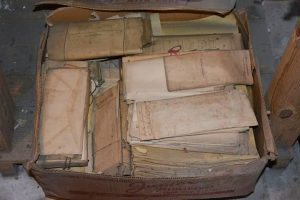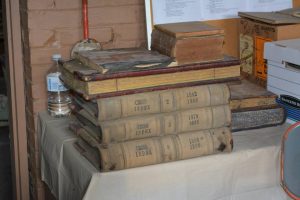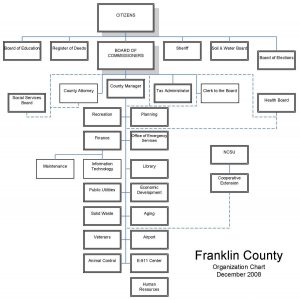By Kay Whatley, Editor
Disappointment. That is the feeling of many in Franklin County following the destruction of public records due to mold contamination. As more details come out, there may be more finger-pointing and blame assigning; but, the truth is that opportunity is lost; no one will ever go through documents that covered a swath of Franklin County NC history.
Lost, Found, and Lost
When the shelves full of old records were discovered in the Franklin County courthouse basement by incoming Clerk of Court Patricia Burnette Chastain, she felt a sense of elation. She immediately engaged the help of the Heritage Society of Franklin County NC. The group came to the courthouse to peruse the extensive find, offering their help with sorting the stacked-and-jumbled records.
There were documents dating back more than 100 years. These included 1800s land deeds, personal letters, and county departmental papers. Since some boxes had collapsed into others, a full inventory would take weeks, maybe months.

Because of the damp in the courthouse basement and suspected mold contamination, the records were handled carefully. Arrangements were made with several benefactors to secure office space, and plans set in motion to move the documents elsewhere for sorting and preservation. This would allow room for working, and allow the courthouse basement to be cleared for cleaning.
The Heritage Society, volunteers, and local business donors came together to ensure an environment and needed tools would be available. The documents would be handled safely, including use of gloves and masks by the growing list of volunteers.

The basement documents were found in Spring 2013. Summer discussions covered both sides of the issue — a rift that became more and more of a divide as it was discussed. Many hands came together to make light work, as the saying goes. Unfortunately, some of the hands involved in securing the records came not to preserve them, but to discard them. Phrases used in official correspondence and during public meetings included safety, mold, sensitive nature, and retention dates. While some in Franklin County were working to secure space for the Heritage Society volunteers, othere were working to evaluate the value of documents that they felt should have been destroyed multiple decades ago — after the required retention dates passed. Access was restricted. One or more county officials began discussing disposal methods with the NC State Archives, while others were looking for the right kinds of gloves and resperator masks.
A detailed timeline of events has been prepared by blogger Connie Jones of Stumbling in the Shadows of Giants. This timeline, created with assistance from Diane Taylor Torrent, is Ms. Jones’ third-party account of events. Her outside-looking-in viewpoint serves as a good overview of the many steps between the documents’ discovery and their end in an incinerator at the Franklin County NC animal control shelter.
According to Franklin County officials, the NC State Archives suggested that due to the potential mold contamination, the records should be destroyed; plus, county records were disposed of routinely and these were just overdue. Similar feedback was received from the NC Administrative Office of the Courts.
From what is known to date, one or more county officials ran with the recommendation, alledgedly making the decision to “dispose” during a supervisor’s meeting. Within a matter of days they arranged for a contractor to pick up the books and boxes from the courthouse — after-hours one Friday evening — and transport everything to the Franklin County animal shelter to incinerate. The burning process took multiple days.
The Heritage Society, which had made arrangements for special facilities, utilities, and equipment, are distraught at the loss of these records. This historical collection cannot be replaced and were not cataloged before destruction. Though a few dozen boxes survived — taken away by the NC State Archives — the majority of the basement contents was gone.
Certainly, those who came to remove the documents after-closing on Friday, December 6, 2013, used protective gear. The Heritage Society of Franklin County NC and its volunteers planned to use precautions too.


In reaching out to the contract company — whose name is clearly shown in the December 6th photo — a gentleman named Ben would only respond to this writer’s questions by repeating (five or six times) the following phrase: “All information will need to be gotten through Franklin County Maintenance.” This was in response to questions related to when Ben’s company was contacted by Franklin County and whether he would confirm that they had removed the documents for the Maintenance Department. The photo can stand as a partial answer to the unanswered questions.
In speaking with an employee at the Maintenance Department, the department’s activities were explained as helping “each department with whatever needs to be done.” An opportunity to speak with the “boss” was offered, kindly, with the additional suggestion that it might be better to reach out to someone at the courthouse.
Emotions Running High, Fingers Pointing
As of this writing, that identity of the county official(s) who made the decision to destroy, and the name of the person who put their key into the lock at the courthouse after-hours on that Friday, are not confirmed by the county.
Photographs taken by the Heritage Society, and photographs taken during the records’ removal, are all that are left at this point. The deed books, journals, letters, and historical documents are ashes.
The prevailing feeling among many Franklin County residents is disappointment. Anger is increasing, especially among members of the Heritage Society, family geneologists, and residents with ties to the Franklin County of the 1800s.
Based on some of the online discussions and comments, there are very few county residents who agree with the county’s actions. Vocal residents and history buffs across Franklin County — and through social media others across the US — are angry at the historical documents’ destruction. There was value seen in these records by so many in and around the county. The swift, even covert, way these documents were removed from the courthouse basement is drawing backlash. The speed, coupled with a lack of review or accountability, is fueling speculation that the records may have been destroyed to prevent land ownership and wrong-doings from being brought out into the light of day.
This organizational chart is from, and property of, Franklin County NC. It is available on the county website, and shows the heirarchy of Maintenance, the Commissioners, and the County Manager. The County Manager is appointed by, and reports to, the Board of Commissioners. The Maintenance Department is shown under Finance.

While the county records show no vote being held, nor the final decision maker, the brunt of the blame is falling on the County Manager: Angela Harris. The county site does not include an outline of duties nor a job description for the County Manager.
At the January 6, 2014, Board of Commissioner’s meeting, public comments were made regarding this issue. Questions posed to the Commissioners were not answered. Several Franklin County residents spoke, with one person calling for the County Manager’s resignation. This YouTube video shows a portion of this meeting. At the end of the video, Commissioner Harry Foy asks Angela Harris for a public response, and she offers to prepare one in writing rather than verbally; that response is pending at this time.
With an incomplete paper trail, the decision to destroy the 1800s-1900s courthouse documents may end up being owned by the Commissioners and the County Manager jointly. No matter where the blame falls, or what actions — legal or electoral — may follow, it would be prudent to ensure this irreversible error is not repeated in any North Carolina county.
Understanding the Loss
Allow me to share my point of view on this happening. In our family, my mother worked on the family genealogy for some time. She had records going back several hundred years – everything from deeds to marriage licenses to photographs and letters. There was something wonderful not only in knowing the history of the family, but being able to perceive different events along the timeline of their lives. And certainly, there was something to be said for holding in your hand a photograph or document that you knew an ancestor had held in their hands,
Also from my perspective, for this newspaper we cover the little bit of history from the state, looking at different buildings, places, people, and events. Occasionally, we work with libraries, courthouses, and the North Carolina State archives to find out more about these historical items. In a recent search, one historical place had very few records. The locals spoke of its many uses over the years and its history, however, working with the local libraries and the state archives, no records could be found. Where the information was finally gleaned was from records at the local courthouse. The local courthouse had scanned, cataloged, or kept every deed and transfer related to the property.
With historians who deal with history every day, and for folks like my mother who treasure family history and look to fill in the gaps along the family timeline, certainly there would be disappointment at the loss of records that might be written about an ancestors or handled by a county official.
Preventing Future Losses
There are many IFs, wishes, and possibilities. There is finger-pointing and blame stemming from frustration of an irreversible situation. Eventually, more details will likely come out, more will accept the consequences of their decision, but in the end the records are lost.
Whether they were lost with some type of ulterior motive to destroy “evidence” of some land crimes against ancestors, or were destroyed through shortsightedness, misunderstanding, or fear of mold, whether it be due to expense or safety, the records are lost. No course of action can bring these records back.
Groups within Franklin County are seeking changes that could be made to county procedures. Some consider this event a call to action, to ask the county to change its processes to ensure a loss like this would not be repeated. The rift between officials and residents is growing.
If you are on the side of Franklin County and feel the distraction was within their rights, no harm no foul, then this may be the end of the story from that viewpoint.
If you are on the side of the Heritage Society and preservation of American history, of the preservation of as much as we can know about our ancestors and the lives they lived, then this may be the beginning of the story for you. The Heritage Society meets monthly on the third Thursday (January 16, 2014) at 1pm at Johnny Bull’s (32 Golden Leaf Drive, Louisburg). Anyone is welcome to attend. In addition to their regular tasks, the Heritage Society is expecting to rally dissent against Franklin County officials.
They see this as a time for activism, to ensure that this event is the only one of its kind; perhaps making it a state-level issue. Currently, a petition online entitled “Don’t Let NC Destroy Century-Old Historical Documents” has been started by NC-resident Susan Wells Vaughan. It would not be surprising to see this become not only a state-wide issue, but a national issue, with headlines touting it as “Inciner-Gate”.
Proper Handling of Moldy, Old DocumentsThe Smithsonian Institution Archives in Washington DC deals with old documents routinely. Online they provide guidance for dealing with moldy documents, poor document condition, and digitizing (scanning) to preserve records for future generations. Nora Lockshin, Paper Conservator, Smithsonian Center for Archives Conservation, offers the following guidance related to old, potentially moldy, documents. While each case should be individually assessed for severity, generally, for close work such as inspection and processing, collections known to be affected by mold should be approached with caution. Mold, whether active or dormant, can trigger respiratory problems in persons with allergic sensitivity or compromised breathing issues, and can cause breathing problems for persons without known issues. If mold is suspected, the items can be treated by special techniques of vacuum freeze-drying to ensure that any live mold can be dehydrated to a point where it will cease growth. The surface mold can then be reduced by a number of surface cleaning processes, so that the materials can be more safely assessed, reformatted as necessary, and a determination can be made as to whether the originals can be safely maintained and used under controlled conditions, or whether they should be recommended for disposal per collection guidelines. The National Archives and Records Administration has recently produced an excellent short documentary video on the preservation of severely mold affected collections that details some of these processes; see www.ija.archives.gov. An excellent 90-minute webinar on mold in library and archives can be accessed on the Connecting to Collections Online Community at www.connectingtocollections.org/moldrecording. Images of mold and further resources can be seen at our blog post at siarchives.si.edu/blog/mold, which also points to “Collections Care Forum of frequently asked questions. With guidance from national experts like Nora, and local historical groups like the Heritage Society of Franklin County, NC, officials may be able to preserve any future treasure troves of history unearthed in NC. |
More Detailed Information
Visit the Franklin County website at www.franklincountync.us. Meeting minutes, financial reports, contact information, and upcoming meetings are available from this site. To reach out to the Board of Commissioners, attend one of their frequent meetings; get to know them, and let them know what is important to you. Seeing how the county is being run, and the work Commissioners are doing, may provide some understanding of how the county functions. It can also provide connections for effective, positive changes.
(Budget reports are not yet available regarding the costs to power the incinerator for more than four days, or the manpower required for feeding the books, documents, photographs, and boxes into the flames.)
Additional information and a timeline are available at Stumbling in the Shadows of Giants.
The blog by Renate Yarborough Sanders may be read at www.justthinking130.blogspot.com.
The Heritage Society of Franklin County, NC Facebook page includes photos of some of the lost records, and their direct experience with Franklin County: www.facebook.com/HeritageSocietyOfFranklinCountyNc.
To sign the online petition, visit www.thepetitionsite.com/988/781/681/dont-let-nc-destroy-century-old-historical-documents.


